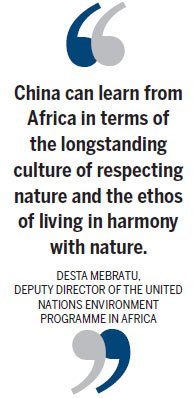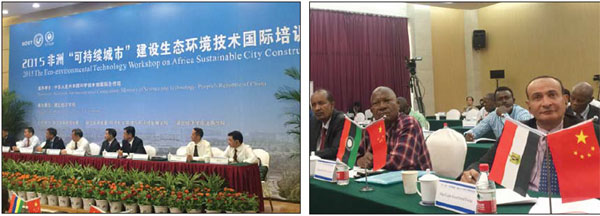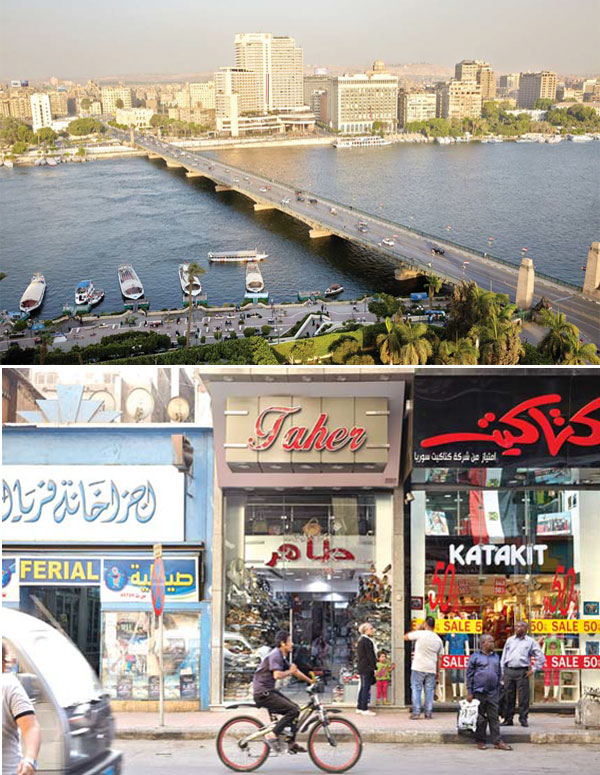When Zhang Min pulled up stakes and left Beijing for Nairobi eight years ago, she was confident she was bidding a final farewell to the heavily polluted skies that had often been her lot in the Chinese capital. What she did not foresee was that the development locomotive that has pulled China toward seemingly boundless economic prosperity over the years - with some of the unwanted baggage - would one day arrive in Africa.
Much to Zhang's consternation, that train has now pulled into Nairobi.
"The reason my husband and I decided to come here with our daughter was the weather and the air," she says.
Schoolchildren look at the central business district from the roof of the Kenya International Convention Centre in Nairobi. Joe Penney / Reuters |
More than 20 government officials and engineers from Egypt, Ethiopia, Kenya, Malawi, Mauritius and Sudan take part in a 15-day workshop on environmental technologies organized by the Chinese Ministry of Science and Technology in Wuhan. Photos by Li Lianxing / China Daily |
"We suffered in Beijing for many years with the extreme pollution, with its haze and its sandstorms. But now along highways in Nairobi you see smokestacks belching out fumes, and I fear that Nairobi will become another highly polluted city."
She concedes that one product of economic development is more factories, but she wonders whether African cities can achieve growth different from the way China did, so that along the way the natural environment does not need to be written off as collateral damage.
For experts and officials, the kind of hope Zhang expresses is entirely realistic. In fact, they say, Africa is extremely well placed to push on with development and at the same time learn the environmental lessons that China has only belatedly heeded.
One key element in ensuring that cities are sustainable is to continuously emphasize clean and green energy consumption and production, says Desta Mebratu, deputy director of the United Nations Environment Programme in Africa. African cities are in the fortunate position of being able to achieve this, he says.
"Unlike many developed countries with mature traditional infrastructure, Africa is still at the early stage of development and urbanization so it has the chance to build sustainable infrastructure. In addition, cleaner systems and technologies are now developing quickly, so this can help Africa move to more efficientregimes."
China can seize the chance to work with Africa together so that they can make a contribution to the world. This is made more likely because China is in economic and environmental transition and the government has invested enormous resources in developing new forms of energy, including solar and wind.
"China is now a strong global advocate of green energy and technology," Mebratu says. "It has

demonstrated a new way of development after some mistakes. So the message coming out is that there are better options for Africa to develop its economy even as it avoids the mistakes."
There is a misconception that it is costly to make cities sustainable because advanced environmental technologies are expensive, he says.
However, he says he can see no reason for African sustainable cities to be expensive. Green technologies have become mainstream in the market, and generating solar energy or wind energy is relatively inexpensive.
Africa and China working together is not simply a master-pupil relationship, because China can learn valuable lessons from Africa regarding green cities, Mebratu says.
"China can learn from Africa in terms of the longstanding culture of respecting nature and the ethos of living in harmony with nature."
Qi Laying, vice-chancellor of Hubei University of Economics in Wuhan, says sustainable cities put a premium on humans living in harmony with nature, and modern technology should be used to analyze the natural environment, social culture and economy to stimulate, design and control all the elements in an eco-environment.
With globalization, environmental and resource issues have become a key issue for everyone, he says. Emerging cities in Africa such as Nairobi should give priority to sustainability in the city's development, in which environmentally friendly technology and learning about the environment play a key role, he says.
Qi made his comments in a workshop on environmental technologies organized by the Chinese Ministry of Science and Technology in Wuhan in October. More than 20 government officials and engineers from Egypt, Ethiopia, Kenya, Malawi, Mauritius and Sudan took part in the 15-day workshop.
One aim was to promote exchanges between China and Africa on sustainable city planning and environmental technologies. In addition to classes, those who attended visited sites to see infrastructure such as city water management, green transport, new-city energy and city waste management at work. The United Nations Environment Programme was a sponsor of the workshop.
Qi says China uses much more energy than most developed countries, exacerbating the conflicts between development and environment. Although some local governments have adopted stringent rules on environmental protection and stiffened penalties for those breaking them, this does not get to the root of the problem, he says.
"Only if we strengthen our capacity for environmental innovation will sustainable development be achieved. So we need broader international collaboration to learn about advanced technologies and to pass on our expertise to developed and less developed cities."
Both China and Africa face challenges in urbanizing and building sustainable cities, he says, and academia, business and government need to be able to compare and swap ideas.
Hazem Abdelnabby, a professor at Benha University of Egypt who is also a visiting scholar at the College of Plant Science and Technology of Huazhong Agricultural University, also in Wuhan, says culture is also a significant component of sustainable cities because it is one element that differentiates cities from one another.
He cites the Egyptian capital, Cairo, saying its cultural heritage is integral to it, and people want to preserve it, even as the city grapples with the burden of a swelling population.
"Cairo was founded thousands of years ago, and the city's spirit holds the people together, so when we started facing population growth as we did half a century ago, we focused on building up new cities around it. But in recent years the city has been unable to cope with its large population."
Cairo and big Chinese cities are similar in that they are well endowed, for example, with educational and health services, so people are attracted to them, he says. Government functions tend to be concentrated in cities, too, which also tends to attract people.
"What we are trying to do is to build new areas on the periphery of old cities to spread resources, and in building new cities China has offered a lot of expertise."
However, there is no point in comparing an ancient city like Cairo with a Chinese city like Wuhan, which, despite its ancient roots, in a sense is a new city. But such Chinese cities can be useful models when it comes to building new cities in Africa and elsewhere.
"For example, we are trying to pick up more skills in preserving water so we can put down more green parks in new cities. This may benefit the whole country because most of our people live around the Nile River region, which occupies only 10 percent of our land, because of a lack of water elsewhere."
Zhang Fenqin, professor of economics at Hubei University of Economics, says Wuhan is well placed to expand this collaboration with African cities, having successfully experimented along with France in setting up a demonstration sustainable city in the Caidian district of Wuhan in 2013.
"A prototype of this city has been set up, and a multilayer, multifunction network is being formed that includes sewerage, green agricultural facilities and large parks. It will provide locals with a comfortable living environment and serve as a model to others."
Zhang says it is also important to share expertise with African cities because the continent points to a new way of development, and China and Africa can help each other by sharing technology and management skills.
Li Fengting, deputy dean of the UNEP-Tongji Institute of Environment for Sustainable Development in Shanghai, says climate change is just one element that has a bearing on sustainability, but it is one to which cities are direct contributors. This is particularly so as industrialization and urbanization continue apace.
"However, most of the world's cities still rely heavily on natural resources for growth, and in fast-growing countries like China the effects are obvious. African countries are still in the early stages of industrialization and urbanization, and they have a lot to learn from what China went through."
To a large extent, sustainable cities presuppose green economics, so it is logical to emphasize use of fewer resources even as efforts are made to remain highly efficient, he says. Though the notion of sustainable cities is idealistic, the mere fact of having that goal is conducive to a better environment.
China needs to slow its economic growth to help make cities more sustainable, and that is a good lesson for Africa, he says.
Li has worked as a coordinator in a South-South collaboration program between the UNEP and China. His work in China and Africa has taught him that it is important to have a broad, holistic urban plan when developing a sustainable city, rather than focusing on a specific industry, he says.
"You may think that if collaboration takes place in one industry or field things will be more likely to happen, but in the longer term, macro coordination generates slower but more sustainable results.
"Some African cities have shown some interest in this idea. For instance, Addis Ababa has signed an agreement with the Chinese government, the UNEP and UN Habitat to make a multilateral-funded urban plan to better use its resources and design industry development in a greener way."

Hawassa, Ethiopia's second-largest city, has a fast-growing population, with all the problems that brings. Yonas Yosef, the mayor, says sustainability for the city means a better living environment for those who live there.
"For us, equality in distributing resources plays a central role in this process. If city development is to be sustainable, all citizens should benefit equally from it."
However, any city that aims to make itself sustainable will face its own set of challenges, Yosef says. For example, the economy of Hawassa is heavily dependent on tourists, many drawn there by nearby Lake Awasa, but urbanization is putting greater pressure on the lake's ecosystem, and a polluted lake will be highly detrimental to the city and its people.
"At the workshop and elsewhere in Wuhan we learned a lot of things. Comprehensive urban planning, modern eco-environmental technologies and education are all vital in establishing sustainable city systems. Picking up this knowledge is invaluable to us."
Huang Zhengli, a researcher at the Chinese University of Hong Kong, says the notion of sustainable cities is a complex idea that covers many areas, including governance, health, housing, environment, transport and lifestyle.
The social and historical backgrounds of Chinese and African cities are very different, he says, with most African cities having a colonial heritage that goes back as far as 200 years and many newer Chinese cities being established and developed over only the past 30 years.
However, urbanization presents African cities with the same kinds of pressures newer Chinese cities have faced over just 30 years, Huang says, and Africa needs to learn lessons so it does not destroy the future of its cities. It can do this by drawing on the lessons China has learned in building sustainable cities.
China's urban planning over the past 30 years has in some cases been disastrous, she says, including housing being built in second and third-tier cities that has been a huge waste because it was not built to meet real needs and has been left empty.
However, urban planning overall in China is mature and is superior to what prevails in other developing countries and even the developed world, she says. Efficiency in governance and the ability to get things done are the most valued assets in developing cities, she says.
"African cities have had a lot of input from various sectors when being built, but governance and allocating resources have been huge problems. It is obvious that urban sprawl is taking place in many African cities, which points to disordered and informal land expansion. That in turn leads to poor land management and urban management."
Because of the importance of good public governance and management in building sustainable cities, Africa would do well to learn from China in this regard, she says.
Top and above: A bridge spanning the Nile River in Cairo. The Suez canal extension and other construction projects have boosted the economy, as thriving commercial areas attest. Photos provided to China Daily |
(China Daily Africa Weekly 10/30/2015 page6




